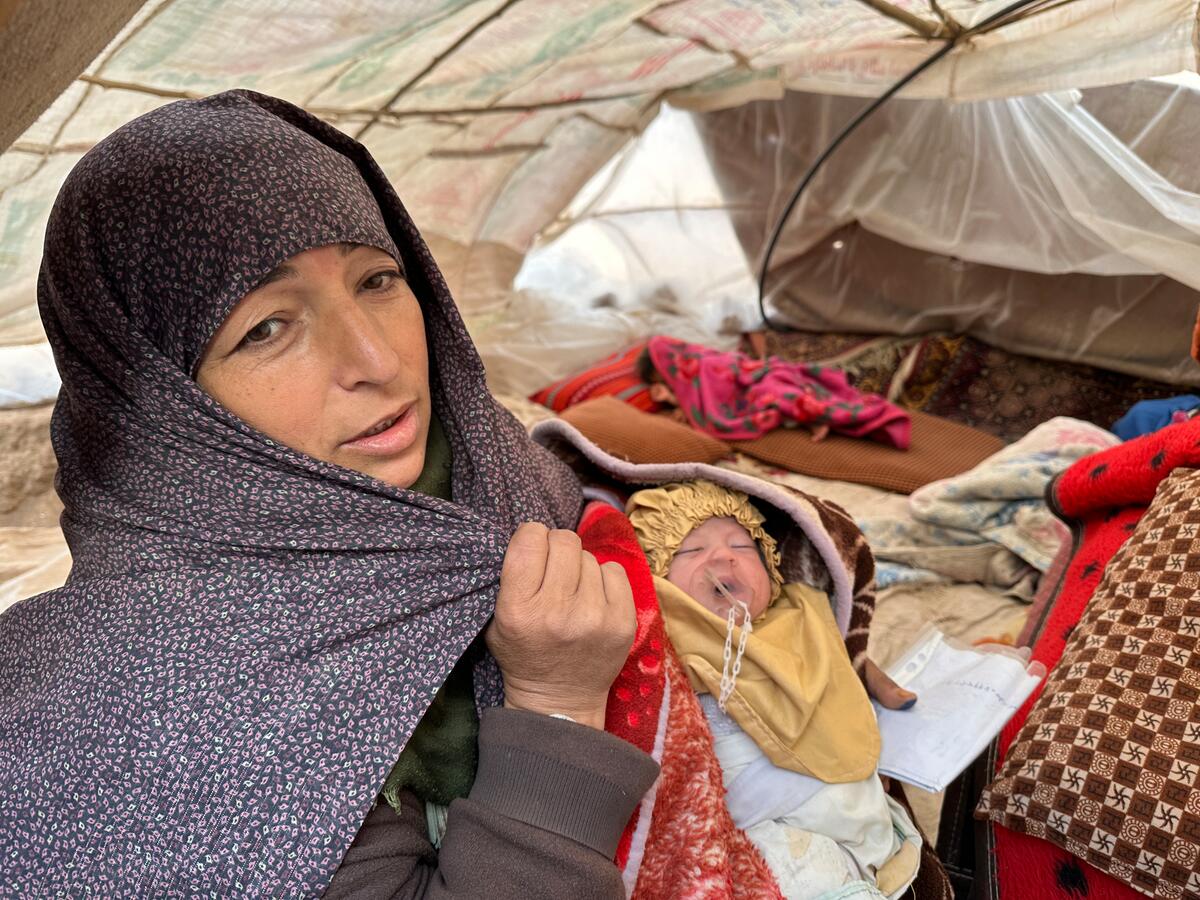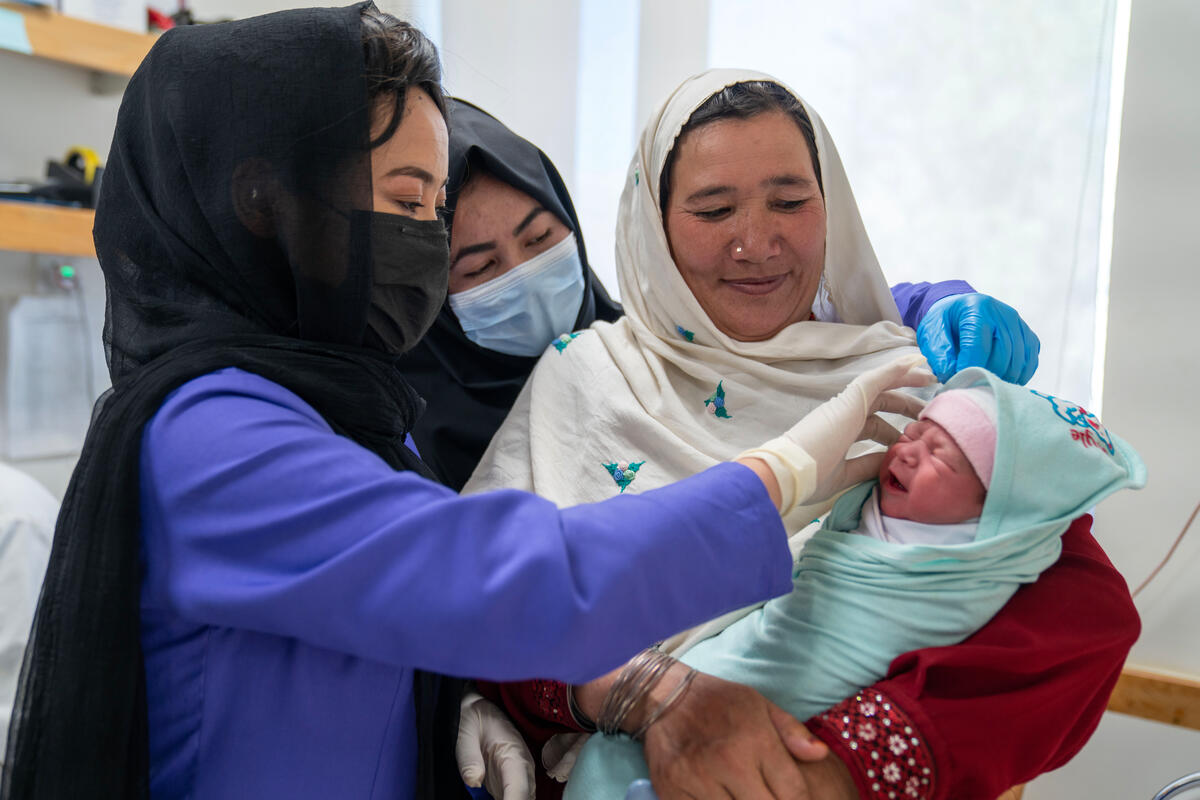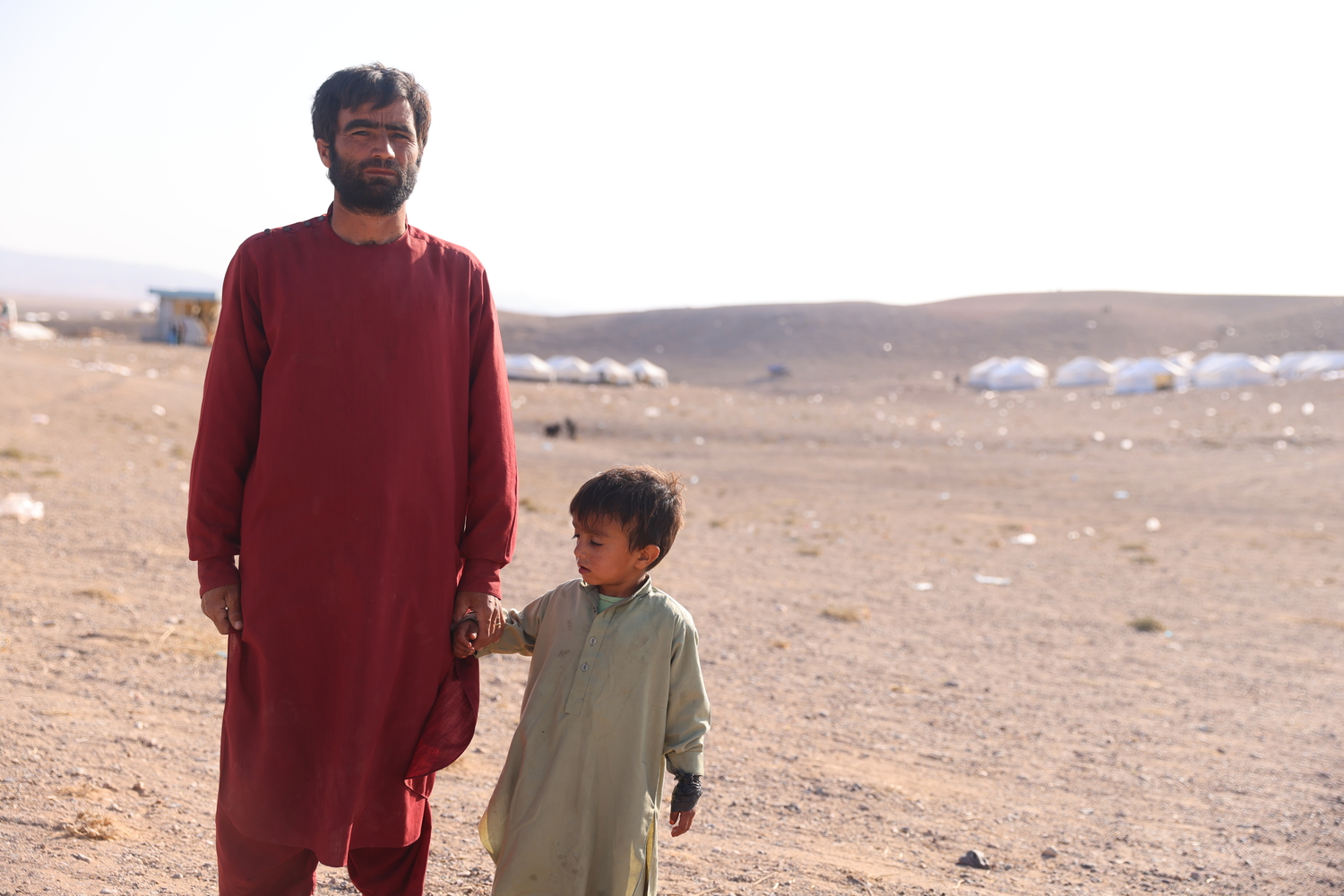Afghanistan Humanitarian Update No. 19
Afghanistan Humanitarian Update No. 19
At a Glance:
- Erratic border crossings into Pakistan continue
- Afghans reportedly resorting to smuggling routes to leave Afghanistan
- Site evaluations and preparations continue in Iran and Pakistan
- UNHCR teams monitor border crossings into Iran
- Tenth airlift scheduled to leave for Peshawar
- Funding shortages threaten emergency preparations
Pakistan Border Crossings
The number of people crossing into Pakistan's Balochistan province through the Chaman crossing or informal routes nearby appears to be erratic. The official border crossing is sometimes firmly closed to everyone; sometimes it is open to people with valid documents and to humanitarian cases - for example the sick, pregnant women and the elderly. And occasionally it has been opened at least for a few hours to larger numbers of people.
On October 9, at least 600 people are believed to have crossed by legal or informal routes in the Chaman area. On October 10, the official border crossing is reported to have been closed, even for humanitarian cases. On October 12, well over 1,000 people are believed to have crossed at the main crossing point. And on October 13, several hundred crossed by legal and informal routes in the Chaman area.
Altogether, taking into account the six or seven other known Balochistan crossing points - and possibly several more unknown ones - UNHCR estimates that an average of more than 1,000 people per day may have crossed into Balochistan over the past 30 days. Many thousands more may have tried to enter and failed. Their current whereabouts and prospects are unknown.
In North-West Frontier Province, a UNHCR partner agency estimates more than 150 families - more than 1,000 people a day - are crossing into Pakistan using 13 different mountain paths. However, the security situation has prevented UNHCR from monitoring the border areas for much of the past week.
Smuggling
With borders closed, Afghans with the money are resorting to organized smuggling networks to get them across. Costs are rising almost by the day. The last reported price for the journey from Kandahar to Quetta was Rs. 1,000 per person, which would mean around $100 for a family of six - a huge sum in Afghanistan and well beyond the reach of most families.
UNHCR is particularly concerned about the very poor, as well as minorities. Many people have travelled long distances from drought- and conflict-affected provinces in the north and north-west of the country, such as Kunduz, Balkh and the Hazarajat. Minorities are almost all forced to resort to smugglers and are apparently being charged much more for everything, including transport, on both sides of the border.
Assistance to new arrivals
Assisting new arrivals remains extremely difficult, with most staying out of sight for fear of being deported back to Afghanistan. However, some benevolent individuals and charitable groups in Quetta have been giving food, clothing and other items to a few destitute families who have just arrived from Afghanistan. Nevertheless, it can be assumed that there are now many families living in extremely difficult circumstances in Pakistan.
Pakistan Site Preparations
Balochistan - In Balochistan Province, six sites have now been assessed. Of these, three (Tor Tangi and Roghani in the Chaman area, and Pishook in Chagai district, some 300 km south of Quetta) appear at this stage to be viable, although none of them can be said to be satisfactory in all respects.
A fourth site - Darra - which at one stage appeared to offer possibilities, now unfortunately appears to be viable for only a relatively small number of people as a last resort. Surveys by Oxfam and Mercy Corps International show that it will take months to increase the flow of water in Darra, and that the shallow wells that served part of the valley when the old Darra camps were set up in the 1980s are now dry.
Two other sites, Badini and Loyband which are a long way north of Quetta, are considered unsuitable, especially Badini. UNHCR is holding discussions with the authorities about the possibility of finding other suitable sites.
North-West Frontier Province - In North-West Frontier Province (NWFP), UNHCR is focusing its efforts on identifying and preparing a total of 15 sites for some 150,000 people. UNHCR is focusing on site negotiations in areas in NWFP where large-scale border crossings are most likely. By the middle of this week, land clearing, road preparation, demarcation and sanitation works should be underway in at least five sites slated to receive incoming Afghans across NWFP, and possibly even in more areas pending NGO activities to shift heavy equipment.
However, UNHCR suffered another setback in NWFP on Saturday, when residents at one potential site - Shalman - said that only a much smaller piece of land than initially expected would be available. The Pakistan authorities had initially indicated that up to 70,000 people could be accommodated at Shalman, though UNHCR put the number at 10,000 people due to the area's lack of water. In a meeting with UNHCR on Saturday, however, local elders refused to provide land sufficient for more than 3,000 persons. The decision by local elders to restrict the size of the Shalman site greatly reduces UNHCR's options.
Shalman is the only site in NWFP where camp construction started in the last week. Some 1,400 tents for emergency use had also already been delivered by UNHCR's local contractors to Shalman, which would have been sufficient for more than 8,000 persons. UNHCR will maintain this border stockpile at Shalman for the time being.
Beyond Shalman, UNHCR is seeking six other sites in Khyber agency, where UNHCR estimates some 55 percent of new arrivals would enter NWFP.
In Kurram agency, three sites have been selected to date. NGO teams visited two sites at Sadda in Kurram Agency on Saturday - Asgharo no. 1 and Asgharo no. 2 - that had already been initially assessed. UNHCR expects to have a more detailed evaluation once this team has compared notes, and expects that work can begin early this week. The third site in Kurram Agency, at Alizai, will be evaluated further by an NGO team on Tuesday and site preparation is expected to begin shortly thereafter.
In North Waziristan agency, two sites have been initially assessed, both in the Saidgai area. An NGO partner sent out teams Saturday to further evaluate the sites, and UNHCR expects the teams to report back early this week.
In South Waziristan agency, one site at Zalai was visited by UNHCR's implementing partner on Saturday, and construction work on the road into the site was expected to start on Sunday. In a positive development, the landowner was very cooperative about the plans to establish a new camp for any possible new Afghan arrivals.
In Bajaur and Mohmand agencies, UNHCR is seeking two more sites from among those suggested by the authorities.
The lack of water and the possibility that the local population may raise further objections clearly indicate the huge challenges of working in the remote Tribal Areas.
Pakistan Contingency Planning / Stockpiles
Detailed contingency plans have now been virtually completed for Pakistan, although they will need to be constantly revised depending on circumstances. The planning covers all sectors and takes into account the likely actors, including relevant government agencies, other UN agencies and local and international NGOs. Pre-positioned supplies not used in Pakistan can be transferred to Afghanistan if required.
A registration system has been tailored to the particularities of this region. Hundreds of thousands of forms will be printed in Peshawar, with 100,000 due to arrive in Quetta in the coming days. Registration teams are being identified and trained to cope with the entire process, from refugee reception at the border, to installation at the sites where refugees will be allocated food, tents and other relief items.
In Quetta, UNHCR is in the process of procuring an initial stock of items such as stoves, blankets, kerosene and used clothing which are not yet available through the international airlifts and the daily convoys bringing in supplies from major manufacturers elsewhere in Pakistan. There are now enough tents (around 7,500) and plastic sheets (9,800) in UNHCR's Quetta warehouse to provide shelter for some 100,000 people.
UNHCR is also planning to open warehouse premises in Chaman, so that an initial supply of relief items can be stored close to the two sites - Tor Tangi and Roghani - that are likely to be used first and which are situated around 20 kilometres south of Chaman town.
In North-West Frontier Province, some 3,500 tents are now on-hand in the Tribal Areas, with a capacity to shelter some 21,000 people. Some 1,400 of these are pre-positioned at Shalman, and more than 2,100 have been sent to forward areas throughout NWFP in order to ensure that any new arrivals can be immediately accommodated at the rugged border crossings.
UNHCR has tens of thousands of additional tents and plastic tarpaulins in its large Peshawar stockpile, with more shelter material, blankets and other goods arriving daily by truck deliveries from producers in Pakistan, and also by airlift from Europe. These goods can be immediately rushed into the Tribal Areas to shelter new arrivals.
Iran Border Movements
Over the weekend, three UNHCR assessment teams monitored the situation along the Iran-Afghanistan border. One team was at the border in Dogharoun, the second team assessed a possible campsite near the Yazdan border crossing in Quaen district together with four German water engineers, while the third team was further south at the Dowkohaneh border crossing near Nehbandan. None of the teams reported any movements of Afghans towards the border.
Scarce and unconfirmed reports from Afghanistan indicate no large movements of Afghans towards the Iran border, as it still officially remains closed for them. However, many have apparently left their homes in the wake of the air strikes, searching for safety either in the countryside or in the mountains. Fear of ad hoc recruitment by the Taliban is reportedly also a factor. UNHCR fears that Afghan refugees could approach the border once their food situation deteriorates, again highlighting the need to get assistance into Afghanistan. For the time being, there may be a small number of unconfirmed arrivals using clandestine routes to enter Iran.
Iran Site Preparations
Late last week, another UNHCR field team, in a joint effort with the Iranian authorities, visited a possible campsite on the Iran-Afghanistan border near the city of Nehbandan. The proposed campsite is located in no-man's land.
Water supply is a major issue in most of the nine identified possible campsites along the Iran-Afghanistan border. At the Yazdan border crossing, for example, preliminary findings show that water would initially have to be trucked in from local wells. Drilling deep water wells at the site itself could take up to four weeks.
Spontaneous Return to Afghanistan
UNHCR's office in Dogharoun reports that the number of Afghans spontaneously returning to their country is now increasing, following a sharp drop in the weeks prior to the air strikes. During the past week, 4,230 persons crossed back into Afghanistan. Most of these persons return to join their families in Afghanistan.
Airlifts
Two UNHCR relief flights arrived in the region over the weekend. A plane from Oslo, Norway, brought 16 "Rubbhalls" (portable warehouses) to Mashad in Iran. A second plane carried 24,540 blankets to Peshawar, Pakistan, from UNHCR stocks in Copenhagen, Denmark.
Another flight - the tenth UNHCR airlift delivery so far - is scheduled to leave Oslo today (Monday) with 12 Rubbhalls and 7,800 blankets intended for Peshawar.
Funding
UNHCR has not received any additional substantial cash contributions from donors since October 8, and funding shortages are now threatening UNHCR's ability to adequately prepare for potential population movements in the region.
On October 11, High Commissioner Lubbers said in a statement, "We have repeatedly stressed the need for international burden-sharing in this emergency so that the neighbouring states, who have already made enormous sacrifices, can afford be more generous in their response as well." The High Commissioner appealed to donors "to make their contributions now, before it is too late."
UNHCR has received only some $12 million in cash contributions of the estimated $50 million needed to care for an initial planning figure of 400,000 new arrivals in surrounding states in the first phase of an emergency. Donor governments have formally pledged another $11 million, but these pledges have not yet been translated into cash. Donors are also providing some $3.1 million worth of in-kind contributions of tents, blankets and other supplies.
UNHCR urgently needs funds to enable it to continue preparations and pre-positioning of relief supplies in case of any influx. Any resources that are pre-positioned for a possible outflow could, however, be transferred inside of Afghanistan as well, depending on how the situation develops. But pre-positioning of supplies at this stage remains crucial to ensure that UNHCR can respond quickly should any major outflow begin.








